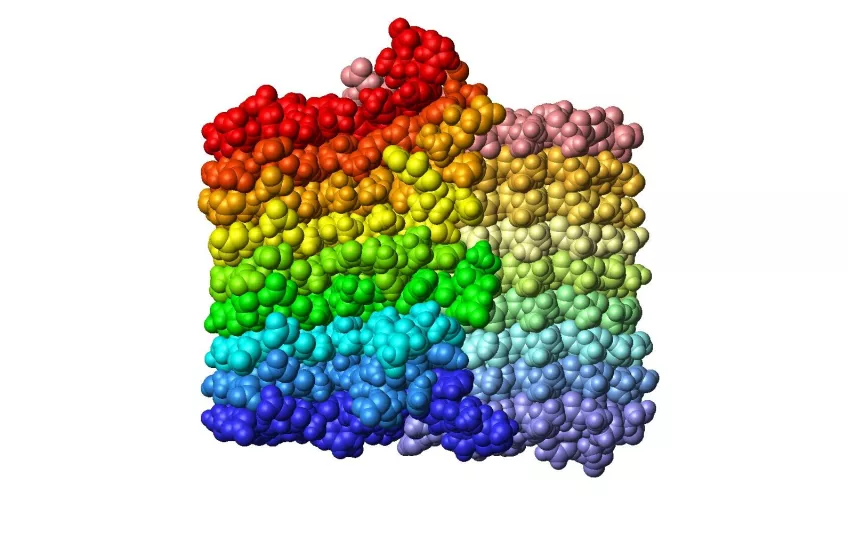PhD project: Solubility of amyloid β peptide
Solubility of amyloid beta peptide as a function of intrinsic and extrinsic factors
You will investigate the solubility of amyloid β peptide and the influence of intrinsic and extrinsic factors, in particular surfaces in the form of nanoparticles and phospholipid membranes, and cosolutes. The ultimate goal is to understand whether the reduced solubility apparent in Alzheimer's disease is a cause or consequence of the disease.
Introduction
We announce one to two PhD positions within a research program called CASCADE - Cause or Consequence in Alzheimer's disease.
You will be part of a collaborative network of students and researchers at the divisions of Biochemistry and Structural Biology as well as Physical Chemistry at Lund University and Neurochemistry at Gothenburg University.
The team of supervisors include Sara Linse, Emma Sparr, Henrik Zetterberg and Jörg Hanrieder.
Website of the Cascade Research Environment
Information about the Division of Biochemistry and Structural Biology
Information about the Division of Physical Chemistry
Project specification
Work duties
The project aims to study solubility of amyloid beta peptide as a function of intrinsic and extrinsic factors. The overarching goal addresses whether a change in peptide solubility is a cause or consequence of Alzheimer's disease. The students will use a top-down approach to study to what extent Aβ solubility is modulated by neurochemical factors. In parallel, a bottom-up approach will be used to systematically investigate the influence of various kinds of nano-structures and surfaces as well as molecular factors such as pH, salt, temperature, co-solvents and lipids as well as peptide sequence variants. Another aim is to reveal to structure of soluble peptide complexes and aggregates formed in vitro and seeded with brain material. To address these scientific questions, we plan to use several state-of-the art methodologies, including optical spectroscopy, nuclear magnetic resonance (NMR) spectroscopy, mass spectrometry, scattering techniques, fluorescence microscopy, and electron microscopy.
The main duties of doctoral students are to devote themselves to their research studies which includes participating in research projects and third cycle courses. The work duties can also include teaching and other departmental duties (no more than 20%).
The doctoral student is expected to work independently, as well as in close collaboration with researchers carrying out other tasks within the project.
Desirable skills
Documented experience of scientific experimental studies of proteins and knowledge in one or several of the experimental methods mentioned above is an advantage. Documented excellent level of English (understanding, speaking, writing) is essential. Excellent communication and presentation skills are also essential. The candidate should have the ability to work in a team and collaborate with people from complementary disciplines.
Document to include with the application: A cover letter (1/2-1 page) expressing a motivation for why you wish to perform a PhD education in physical chemistry at Lund University, and how the present research project matches your own research interests and scientific background.
Enrolment: Physical chemistry at the Science faculty
The subject curricula (general syllabi) for subjects within chemistry, amended in June 2019, are currently being translated and will appear on the Science faculty's page for General syllabi and individual study plans soon.
Science faculty's page for General syllabi and individual study plans
Supervisor
Sara Linse, Professor at the Department of Biochemistry and Structural Biology
Sara Linse's research interests, group members, publications and teaching
Positions in the 1st call
The call was open from 23 March until 4 May 2020. Of the ten PhD students that were successfully recruited in this call, eight are eligible for GenerationNano funding.
- Smart nanomaterials for green-tech applications
- Characterization of nanostructured magnetic materials
- PhD project on information as fuel
- Photon detection & sustainable energy
- Ultrafast spectroscopy for new solar energy solutions
- Biomarker detection by optical sensing with nanowires
- Morphology and virulence among bacteria
- Multiscale biomechanics from molecules to cells in cancer
- Solubility of amyloid beta peptide (up to two positions)
- Nanoparticles in the brain: multitalented drug carriers to target neurodegenerative disease


